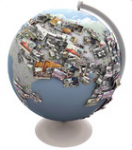Community Embraces New Word Game at Mid-Year Play Day This past Sunday, families at Takoma Park’s Seventh Annual Mid-Year Play Day had the opportunity to experience OtherWordly for the first time. Our educational language game drew curious children and parents to our table throughout the afternoon. Words in Space Several children gathered around our iPads […]
Read moreTag: knowledge
 Crowdsourcing can build virtual community, engage the public, and build large knowledge databases about science and culture. But what does it take, and how fast can you grow?
Crowdsourcing can build virtual community, engage the public, and build large knowledge databases about science and culture. But what does it take, and how fast can you grow?
 For some insight, we look at a crowdsourced history site: Historypin is an appealing database of historical photos, with dates, locations, captions, and other metadata. It’s called History “pin” because the photos are pinned on a map. (See recent article about Changes over time, in photos and maps.) Some locations have photos from multiple dates, showing how a place has changed over time, or cross-referenced with Google Maps StreetView. Currently, Historypin has 308k items, from 51k users, and 1.4k institutions. This is a graph of pins over the last three years: (more…)
For some insight, we look at a crowdsourced history site: Historypin is an appealing database of historical photos, with dates, locations, captions, and other metadata. It’s called History “pin” because the photos are pinned on a map. (See recent article about Changes over time, in photos and maps.) Some locations have photos from multiple dates, showing how a place has changed over time, or cross-referenced with Google Maps StreetView. Currently, Historypin has 308k items, from 51k users, and 1.4k institutions. This is a graph of pins over the last three years: (more…)
 Wikipedia has 4,362,397 articles in English. But how many of those are seriously encyclopedic, and what are the most important articles?
Wikipedia has 4,362,397 articles in English. But how many of those are seriously encyclopedic, and what are the most important articles?
We’ve been looking closely at Wikipedia for an upcoming app. We wanted to know the most important articles. We calculated an importance score for every article, based on how richly linked a Wikipedia article is within Wikipedia (the number and quality of links to a page), how many languages an article has been translated into, the brevity of the title, how popular an articles is (web hits), and the number of citations/references of an article (scholarliness).
The following are our results. This is an arbitrary, but interesting ranking, so we wanted to share it: (more…)

